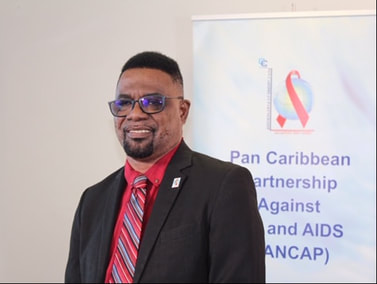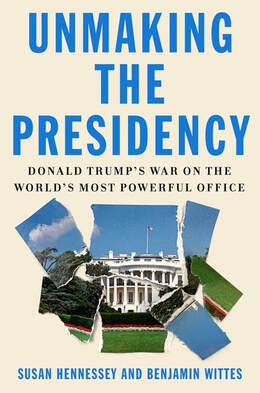 Mr. Dereck Springer's tenure as Director of the Pan Caribbean Partnership against HIV (PANCAP) ends on February 28, while this blog is being distributed. This is a slightly modified tribute delivered at the 37th meeting of CARICOM's Council of Human and Social Development (COHSOD) in Washington DC on September 28, 2019 . I have been closely associated with PANCAP from its inception in 2001 and was Advisor to PANCAP during Dereck's tenure as Director. I feel obliged to share this tribute to a creative and outstanding leader. ----------------------------------------------------------------------------------------------------------------------------- When Dereck announced over one year ago that he would not renew his contract as Director of the Pan Caribbean Partnership against HIV AIDS (PANCAP) every level of the partnership persuaded him — indeed begged him — to reconsider . Some even engaged in soft diplomacy which went something like this “Dereck man! just give us one more year”. Faith leaders prayed that spiritual redemption will change his mind and the youth pleaded for his continued mentorship. Nothing worked. No power on earth or the Holy Spirit for that matter could change his mind. A Jamaican colleague in frustration confessed “Dat man Dereck, he like the rock of Gibraltar: ‘to raw-tin’- him stand firm” But this should come as no surprise for those of us who came to know him professionally. The keywords from the many tributes attest to this:
These are not just platitudes nor lyrics They truly characterize Dereck as a man of the time, in the time and for the time As a man of the time, he came to the leadership of PANCAP at a difficult period when sources of external funding for the AIDS response were drying up ; when making the case for the Caribbean deemed as middle and upper income countries could no longer easily yield concessional funding; when complacency for the AIDS response was increasing and political will declining in the face of so many competing demands; and when the PANCAP Coordinating Unit (PCU) Staff was being depleted as a result of these cumulative tendencies. Yet Dereck remained undaunted: ever seeking new ways to overcome the challenges and in the process, molding the PCU into one of the most efficient and effective units within CARICOM He was man in the time. When faint hearts would have succumbed, He remained optimistic : reformulating the scope and substance of the partnership , repurposing its programmes and uplifting its morale toward greater inclusion. Among the innovations are webinars, knowledge for health , national and regional stakeholder consultations —all of which have contributed to collective leadership, a prerequisite for the sustainability of PANCAP after Dereck. These together have also no doubt blunted the doom and gloom about the future of the partnership that prevailed when he assumed office Dereck was a man of the time. Not only has he been aware of the need for PANCAP to change gear but also to find new expressions for galvanizing the various strands of the partnership weaving them into a cohesive web. Its inter interlocking creed was to become Justice for All for which he so passionately advocates. It is universal yet indigenous. It illustrates the essence of how with common cause AIDS can truly be ended. Besides being of and in the time, Dereck is a man for the time. He came to the Directorship with training and experience in public health, counseling, social psychology, epidemiology and philanthropy. Small wonder he was able to establish the foundations for the changing times ahead: one in which PANCAP’s stakeholders —parliamentarians , faith leaders, civil society, youth advocates, key populations and donor partners ofttimes with varying methods could adhere and contribute to the core value and common goals and programmes so adequately outlined in the Caribbean Regional Strategic Framework (CRSF) 2019-2025 This is a portrayal of the true legacy of Dereck’s inspiring leadership. When combined with his growing reputation in the international theaters, especially on the Board of the Global Fund, it is my hope that his resounding assets will be available to and utilized for the benefit of the regional and Global struggles to achieve the targets of SDG #3 Good health and well-being in this aspiration, ending AIDS is one component of the global integrated health agenda. It has been my privilege to work with a colleague of Dereck’s ilk and to feel the vibrations of his sensibilities, sense of duty and concern for the vulnerable. Under his leadership we witnessed PANCAP’s maturity into the quintessential essence of functional cooperation. For these transcendent qualities of being in the time , of the time and for the time, Dereck has taken PANCAP to soaring heights of achievements, respectability and honour. For all these reasons we celebrate his contribution to the region. Those within and outside the Caribbean Community with whom he engaged over these nine years will no doubt join PANCAP in recording an ever inadequate appreciation to Dereck for his sterling service and also to his family for allowing us to consume so much of the time, talent and fortitude of this outstanding human being. Eddie Greene
3 Comments
2/20/2020 Further Considerations in GUYANA’s Impending Bonanza from Oil and the Political StormRead Now GOFAD out of an abundance of caution in interpreting the myriad of conflicting information, steered clear of the echo chamber of ‘self styled experts’ and ‘media huskers and hustlers’ that may be capitalizing on the political storm on the eve of the Guyana’s General Elections on March 2, 2020. It advocated that discussions on the way forward needs to place the objectives of the National Resource Fund (Sovereign Wealth Fund) Act in the broader context of Guyana's sustainable development. These include:
Interrelations of Government Take Clive Thomas in an insightful article in the Guyana’s Sunday Stabroek News (February 16, 2019 p.13) referred to the debate on the Guyana 'Government’s Take' of the impending oil bonanza as disappointingly “more noise and nonsense". He points out that the arguments in the debate generally fail to recognize the technical component and the challenges of measuring ‘Government Take’ which is a price “determined by forces of demand and supply in an economic market worldwide.” He illustrates that the owners of the supply of petroleum acreage negotiate the fiscal terms and other conditions for granting permission to explore and that these fiscal terms and conditions include bonuses, rentals, royalties and production sharing agreements (PSAs). They also include investment incentives and the price the investor must pay to explore and develop the acreage. Rystad Energy, an independent oil and gas consultancy service provides a comparison of total government take from several upstream projects in selected countries and shows that Guyana with 60% compares favourably with Brazil 63% and Suriname 65% and is higher than USA 57% and Israel 55%. But Thomas cautions that Guyana’s fiscal terms differ from those of other countries “irrespective of the competitiveness of these terms”. The significant lesson from Thomas’ analysis is that the fiscal terms are certain to be adjusted in time, since Guyana’s PSA is a dynamic document open to change and improvement. Greater focus on the Context of the Negotiations At the same time, a comment by Professor Havelock Brewster provides a sanguine interpretation of the context of Guyana’s negotiation with Exxon. He is of the view that the Guyana Government and its advisers had little or no access to insider information, nor the capacity to verify any of the crucial variables such as the amount of capital and start up cost; or the amount of output, operational cost, pricing and revenue. This is a true reflection of the adage ‘the devil is in the detail’. His view is that Guyana was treading in circumstances of ‘the unknown’. In this regard, the view from The Global Witness report that Guyana could have secured a much better percentage of “revenue”, more in line with that of other oil producing countries, needs further scrutiny. Brewster points out that consideration must be given to both the prevailing internal political issues, and the international issues. He concludes that this brings to the fore the nexus of concerns about Exxon negotiating strategy and leverage, the ongoing International Court case on the Venezuelan claim, Guaido’s close relationship with the US President, with strong support coming from both the Republican and Democratic Parties, emboldening Guaido ‘s claim that the oil belongs to Venezuela, and the effect of Russia’s and China’s backing of Maduro and the US stance on Venezuela vs Guyana. “All this must create considerable uncertainty, and political limits to driving too hard a bargain with Exxon. To put it simply, there must be, in such circumstances, a leaning towards locking in the deal, even at some cost, going for the bird in the hand rather the bird in the bush”. He goes further by indicating that the gamble could be obtaining the ideal or ending up with zero and states that “no other oil producing country, to my knowledge, has faced this kind of one-sided uncertainty in negotiating with Exxon”. Charting the Way Forward As Guyana moves forward with securing its best interest, it is estimated that it will realize US$165billion over the life of the present contract with Exxon. How it utilizes the oil bonanza to benefit the Guyanese people will be further explored. As a starter it will depend on the following:
These contending tendencies could have wider and long lasting implications. CARICOM member states may yet find themselves with a fragmented rather than a cohesive foreign policy. And this will not augur well, neither for Guyana nor CARICOM. Eddie Greene  As Guyana continues to increase its oil lift at an estimate of one million barrels by the end March 2020, there is much debate on how Guyanese will benefit. The persistent questions being raised, include whether the negotiations with Exxon Mobil brokered a favorable deal for Guyana or if it squandered the patrimony of the Guyanese people to Exxon Mobil, Hess and the other international conglomerates involved in the exploration and eventual oil lift . Conflicting versions The current political climate in the lead up to the General elections on March 2 continues to fuel the debate with conflicting information and claims by the contending political parties. The main opposition groups are advocating what is best represented in an advertisement in the local newspapers that the government is culpable and incompetent for “selling property (oil) without knowing its value.” This view is complemented by a report, Signed Away issued by Global Witness, an International NGO, and published February 7. The Report concludes that by the terms of the negotiation with Exxon Mobil, Guyana stands to lose US$55 Billion over 40 years. In 2011, Global Witness exposed a US$ 1.1B bribe by Shell Limited with respect to Nigeria Oil exploration, implicating that country’s Minister of Natural Resources. The Guyana Government on the other hand has contested this and other statements as false and misleading. It has launched a publication , GUYANA PUBIC SECTOR LOCAL CONTENT POLICY on February 10, 2020 by the Department of Energy in the office of the President. In essence, local content is recognized to be the sum of input of local goods and services including employment across the oil and gas value chain. It also establishes the benefits that are predicted to accrue for investments of the revenues from oil in education, health, infrastructure etc. It points to the fact that Guyanese suppliers have been sensitized to the available opportunities and that provision is made for Guyanese public awareness of the actual plans for the management of the resources from oil. Allied announcements of significance from the Department of Energy are that :
Subsequently, Exxon explained that royalty is based on participation at no cost to Guyana whereas working interest pays its share of costs to explore and develop the project. According to its statement, Exxon advanced all of Guyana’s share of the cost and Exxon would have borne the entire loss if they did not find oil: “from day 1 , Guyana receives 14.5% of the project cash flow. Then after Exxon recovers the cash it advanced to Guyana, Guyana’s cash flow leaps to 37% more for a total 52 % advantage. The opinions of Open Oil, Global Witness and the IMF are far less positive about the deal. These divergent perspectives require closer investigation, beyond the ability of GOFAD, under the present circumstances requiring the verification of conflicting information. The National Resource Fund : Transparency and Accountability However, there are important developments intended to enhance transparency and accountability. First, is the setting up of the Natural Resource Fund (NRF) commonly referred to as a Sovereign Wealth Fund. Second is the establishment of a Public Accountability and oversight Committee (POAC). According the Act, the POAC will comprise 22 members, independent of political affiliation and representing the community interest. It will be responsible for increasing public awareness through disseminating evidenced based information and active public engagement. The POAC will be charged with the responsibility of promoting short, medium and long term priorities for use of the resources from Oil, consistent with the Act establishing the National Resource Fund. The establishment of the POAC is a recognition that in today’s world, for public policy to be effective, it can no longer be the preserve of state actors or limited to the notion of public-private partnership. Non-state actors – NGOs, civil society, corporations, think tanks, influential personalities, the media, faith-based organizations, youth etc. — play an increasingly influential role in the decision making including the conduct of diplomacy and international relations. It is therefore expedient that they be tapped as supportive advocates. In this regard, the University of Guyana Energy Think Tank (UGETT) is an important initiative to accelerate the working links between Civil Society and academia working in this cutting edge area, critical to Guyana’s sustainable development. UGETT has already been engaged in fostering an understanding of the issues related to the NRF and established in the NDF Act. See https://finance.gov.gy/publications/guyana-natural-resources-fund-bill-2018-2/ The NRF Act specifically refers to compliance and management of the fund with respect to good governance and international best practices, including the Santiago Principles. In this regard the Chilean Sovereign Wealth funds established since 2006 is a commitment transparency. It ensures access by the public to relevant activity through an exclusive website that publishes information on all the fund’s monthly, quarterly and annual reports; and the legislation pertaining to the funds at the recommendation of the Financial Committee in its annual reports. In Guyana’s Fund, the Bank of Guyana is responsible for the operational management of the fund which is authorized to expend one third on development programmes and an untouchable two-thirds to the NRF for the future. But, there are several outstanding elements of the Act still to be fulfilled, no doubt stymied by the pending elections on March 2. They include the actual appointment of members of the PAOC, Budget of the PAOC and renumeration of the members PAOC. The POAC and Think Tanks such as UGETT therefore play a vital role and can together serve Guyana’s interests best, if, in addition, they focus their discussions on building capacity for monitoring and evaluation, highlight anti-corruption policies, promote lessons learned from the experiences of other oil and gas ventures especially in developed countries that help to avert looming outcomes such as the ‘Dutch Disease’ The Way Forward: Broader Strategic Issues of Sustainable Development The discussion on the way forward needs to place the objectives of the NRF Act in the broader Guyana's sustainable development in the context of the Caribbean Community. These include:
Eddie Greene  [Today] we published a new book, “Unmaking the Presidency: Donald Trump’s War on the World’s Most Powerful Office.” It reflects nearly four years of thinking about the interaction of President Trump’s personality and the powers of the office he holds; thinking that has evolved as we have witnessed the ways in which the man and the office have coexisted and clashed. We think it is genuinely different from other works in the growing literature on President Trump and hope you will find it valuable. The core argument we advance is that Trump—though not a political theorist by any means—is proposing a revision to a broadly shared understanding of the American presidency. This may seem to give too much credit to an administration that often appears to function more as an impulse control disorder than under any rational theory of governance. We argue, however, that behind all Trump’s violations of the norms of the presidency is an actual vision of the presidency—if only an inchoate vision that Trump himself might be unable to articulate. This vision, we argue, is radically different from the assumptions of the traditional presidency. “Unmaking the Presidency” is an attempt to take this vision of the presidency seriously: to describe it in detail, to study how it manifests across a range of presidential powers, and ultimately to defend the traditional presidency from Trump’s proposed revision of the institution. What is Trump’s vision? As we say in the book’s introduction: Most of all, Trump proposes a presidency that elevates the expressive and personal dimensions of the office over everything else. It is one in which the institutional office and the personality of its occupant are almost entirely merged—merged in their interests, in their impulses, in their finances, and in their public character. In elevating the expressive, vanity-plate dimensions of the office and making it a personal vehicle for the public self-expression of the officeholders, he proposes sublimating nearly all other traditional features of the presidency: its management functions; its expectation of good-faith execution of law; its expectation of ethical conduct, truthfulness, and service. This vision of the presidency thus unsurprisingly produces a genuinely novel set of deployments of the executive’s traditional powers, ones that are profoundly different from those of prior presidents. One of the arguments we advance in “Unmaking of the Presidency” is that Trump’s abuse of his office is fundamentally different from traditional separation of powers fights over executive power, in which presidents have sought to aggrandize their office by pushing at the margins of its authorities. Trump’s abuses, as we try to show in the book, have not taken place at the edges of the president’s powers; they have almost uniformly occurred, rather, at the core of the president’s authorities. They have involved his powers to appoint and remove executive branch officials. They have involved his processless administration of the executive branch. They have involved his pardons, real and threatened. They have involved his supervision of law enforcement to reward his friends and punish his enemies. They have involved the impulsive and chaotic manner in which he conducts foreign policy. They have involved his pursuit of financial self-enrichment. They have involved his abusive speech. They have involved his lies. Most fundamentally, they have involved what is perhaps the most novel proposition of the Trump’s presidency: that civic virtue does not matter. The traditional presidency places a high value on civic virtue. The effectiveness of the presidential oath of office depends on it pervasively. But Trump has operated his presidency without the slightest pretense of anything of the kind. He makes plain that it’s all about him, not about public service or about pursuit of the national good. This oathlessness, we argue, lies at the core of Trump’s vision, and it underlies many of the specific deployments of presidential power we discuss. The book covers a lot of ground. It begins with Trump’s oath of office and then explores the disunity of the executive branch under his leadership, the total breakdown of executive branch decision-making processes, Trump’s highly innovative style of presidential speech, his inexhaustible fountain of lies and disinformation, his contempt for ethics regulations, his vision of justice and federal law enforcement, his approach to being investigated, his impulsive conduct of foreign affairs, and his use of the unreviewable powers of his office. The goal, along the way, is to describe how we came to form particular expectations of the presidency, so the book goes into a lot of history of the presidency—some of which, we hope, will be entertaining as well as interesting. In the end, though, the book is a defense of the traditional presidency, which seems to us to need a defense right now. Today, as we write these words, the Senate is beginning the impeachment trial of President Trump. One year from now, he will either be reinaugurated or replaced. That means we are in a year of decision: Is Trump’s vision of the presidency one the American public wants to ratify? Or is it a vision that requires repudiation? Susan Hennessey is the Executive Editor of Lawfare and General Counsel of the Lawfare Institute. She is a Brookings Fellow in National Security Law. Prior to joining Brookings, Ms. Hennessey was an attorney in the Office of General Counsel of the National Security Agency. She is a graduate of Harvard Law School and the University of California, Los Angeles. Benjamin Wittes is editor in chief of Lawfare and a Senior Fellow in Governance Studies at the Brookings Institution. He is the author of several book |
Details
AuthorEdward and Auriol Greene Directors, GOFAD. Archives
April 2022
Categories |
Global Frontier Site Links |
Contact InformationEmail: [email protected]
Twitter: @GofadGlobal |

 RSS Feed
RSS Feed
